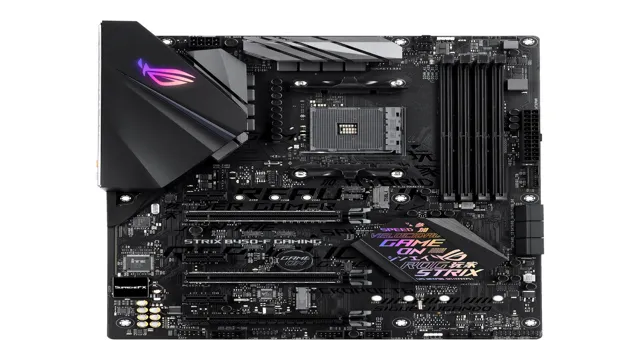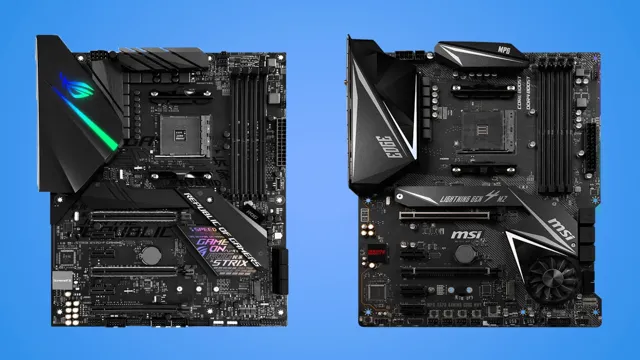When it comes to building a powerful gaming PC, one of the most important components is the motherboard. And if you’re looking for a motherboard that’s specifically designed for AMD’s Ryzen processors, then ASUS has got you covered. ASUS has a range of Ryzen motherboards available on the market, each with its own specific features and functionalities.
But with so many options out there, how do you know which one is the right choice for you? We’ve got you covered with our comprehensive review of ASUS Ryzen motherboards. We’ll be taking a closer look at the features and specs of some of the most popular ASUS Ryzen motherboards available, helping you make an informed decision and take your gaming experience to the next level. So, if you’re ready to upgrade your PC and take your gaming to the next level, read on to find out which ASUS Ryzen motherboard could be the perfect fit for you.
Introduction
Looking for a high-performance motherboard that can handle the top-of-the-line AMD Ryzen processors? Look no further than the ASUS Ryzen motherboard! Designed with extensive overclocking potential, this motherboard is ideal for gamers, developers, and content creators who demand the best. Not only does the ASUS Ryzen motherboard offer speed and power, but it also delivers impressive stability and durability. With top-of-the-line features such as USB
2 Gen 2 Type-C ports, onboard Wi-Fi 6, and PCle 0 support, the ASUS Ryzen motherboard is the perfect choice for anyone looking for a powerful, reliable motherboard. So whether you’re building a new computer from scratch or upgrading an existing one, the ASUS Ryzen motherboard is worth considering.
Overview of Ryzen and ASUS
Ryzen and ASUS are two buzzwords that have been dominating the tech industry lately. AMD’s Ryzen processor line has been creating quite a stir with its unbeatable performance and affordable pricing. ASUS, on the other hand, is a well-known brand for computer hardware, particularly motherboards.
When these two meet, we get a powerhouse of a machine that is capable of running demanding applications with ease. ASUS motherboards are built to deliver maximum compatibility and performance for Ryzen processors. This combination offers a robust solution for gamers, content creators, and professionals alike.
With the Ryzen and ASUS collaboration, the possibilities for creating a high-performance system are endless. Let’s dive deeper into this partnership and see how it’s changing the game in the tech world.

Why Ryzen is popular
Ryzen Introduction: Over the past few years, the Ryzen processor has gained immense popularity and has become a go-to choice for many gamers, professionals, and tech enthusiasts. The Ryzen’s rise is largely due to the outstanding performance it offers, making it an excellent choice for demanding tasks such as video editing and gaming. The Ryzen processor offers better value for money than its competitors, and its high-end options are often more affordable than their Intel counterparts.
In this blog post, we will discuss why Ryzen is so popular and what makes it the preferred choice for many tech enthusiasts.
Key Features
Looking for a powerful motherboard that can handle the latest Ryzen processors from AMD? Look no further than the ASUS Ryzen Motherboard. With a range of key features, this motherboard is designed with performance and speed in mind. One important feature is the support for high-speed DDR4 memory, which can help to boost overall system performance.
Additionally, the motherboard includes built-in Wi-Fi and Bluetooth connectivity, making it easy to connect to your network and other devices. You’ll also appreciate the advanced cooling technology, which helps to keep your system running cooler even under heavy loads. And with support for multiple graphics cards, you can build a system that’s ready to tackle even the most demanding titles.
For gamers and power-users alike, the ASUS Ryzen Motherboard represents an excellent choice for a high-performance system.
Socket compatibility and form factor
When it comes to choosing a CPU socket, compatibility and form factor are key factors to consider. Socket compatibility refers to making sure that the CPU you choose is compatible with the motherboard you have or plan to purchase. Different CPUs use different sockets, so it’s important to research and choose the one that’s right for you.
Additionally, form factor is important to consider when building a computer. Form factor refers to the physical size and shape of the motherboard, and it’s important to make sure that it will fit in your computer case and that all the necessary ports and headers are available. By considering both socket compatibility and form factor, you can ensure that your CPU will fit properly and function optimally within your computer.
Performance and overclocking capabilities
When it comes to performance and overclocking capabilities, there are a few key features that you should consider. Firstly, the processor plays a crucial role in determining how fast the system runs and how well it can handle intensive applications. Intel and AMD are the two major players in this regard, and both offer a range of processors that are optimized for different types of tasks.
Another important factor is the amount of RAM available, as this helps to ensure that the system can keep up with the demands placed on it. Additionally, the type of storage used can also impact performance, with solid-state drives generally being faster than traditional hard drives. Finally, a good graphics card can help with applications that require high levels of visual processing, such as gaming or video editing.
By taking all of these factors into account, you can build a system that is fast and responsive, with plenty of headroom for overclocking if you need it.
Connectivity options and ports
When it comes to buy a laptop, a key factor to consider is its connectivity options and ports. Without these features, you may find yourself struggling to connect to various devices and peripherals. Most modern laptops come equipped with several standard ports, including USB, HDMI, and audio jacks.
But some higher-end models also feature Thunderbolt 3 ports, which offer even faster data transfer speeds and can connect to multiple displays simultaneously. Additionally, some laptops now come with 4G LTE connectivity, which allows you to stay connected to the internet even when you’re out of range of a Wi-Fi network. So if you’re looking for a laptop that can keep up with your fast-paced lifestyle, be sure to consider its connectivity options and ports in order to stay connected to the world around you.
Pros and Cons
Asus Ryzen motherboards are a popular choice among PC enthusiasts due to their reliable performance and compatibility with AMD CPUs. However, like any product, there are pros and cons to consider before making a purchase. One advantage of Asus Ryzen motherboards is their versatility, allowing you to customize your PC build to fit your specific needs.
They also come with advanced features such as overclocking support, multiple M.2 slots, and a robust BIOS interface. On the downside, Asus Ryzen motherboards can be quite expensive compared to other options in the market.
Additionally, some users have reported issues with the RGB lighting and audio drivers. Overall, if you’re willing to invest in a high-quality motherboard with advanced features, then Asus Ryzen might be the right choice for you.
Advantages of using ASUS Ryzen motherboard
When it comes to building a computer, choosing the right motherboard is crucial. One popular option is the ASUS Ryzen motherboard. There are many advantages to using this motherboard, but it is important to consider both the pros and cons.
Pros: – High-quality components: ASUS is known for using high-quality components that ensure reliability and longevity. – Easy overclocking: The ASUS Ryzen motherboard makes it easy to overclock your CPU and get the most performance out of your system. – Multiple PCI-E slots: This motherboard has multiple PCI-E slots, which is great for those who need to install multiple graphics cards or other expansion cards.
– Fast connectivity: The ASUS Ryzen motherboard comes with fast connectivity options, including USB 1, Wi-Fi, and Ethernet. Cons: – High cost: The ASUS Ryzen motherboard is more expensive than some other options on the market.
– Limited RGB lighting: If you’re looking for a motherboard with a lot of flashy RGB lighting, the ASUS Ryzen motherboard may not be the best choice. Overall, the ASUS Ryzen motherboard is a great choice for those who want a high-quality, reliable motherboard with great performance and connectivity options. However, it may not be the best choice for those on a tight budget or those who want a lot of RGB lighting.
Disadvantages and potential drawbacks
When it comes to online learning, there are both advantages and disadvantages. One of the main benefits is the flexibility it offers, as students can work at their own pace and schedule. Additionally, online courses are often more affordable and accessible than traditional classroom settings.
However, there are also potential drawbacks to consider. For one, online learning can be isolating, limiting the opportunity for in-person interactions and support. Additionally, some students may struggle with the self-discipline and accountability required to succeed in an online environment.
Overall, it is important to weigh the pros and cons when deciding whether online learning is the right choice for you.
Conclusion
In conclusion, the ASUS Ryzen motherboard is the perfect combination of style and substance. It boasts impressive features that make it a top choice for those looking for a high-performing and reliable motherboard. Whether you plan on building a gaming rig or a workstation, the ASUS Ryzen motherboard delivers as promised.
With its sleek design and top-notch performance, this motherboard is sure to make your PC build stand out from the crowd. In short, if you want a motherboard that doesn’t compromise on quality or aesthetics, the ASUS Ryzen motherboard is the way to go. Trust us, your computer (and your ego) will thank you for it.
“
FAQs
What are the benefits of using an ASUS Ryzen motherboard?
ASUS Ryzen motherboards offer exceptional performance and reliability for gaming and multitasking. They also come with advanced overclocking capabilities and support for new technologies like PCIe 4.0 and Wi-Fi 6.
Which ASUS Ryzen motherboard is the best for gaming?
The ASUS ROG Strix X570-E Gaming is considered one of the best ASUS Ryzen motherboards for gaming. It comes with advanced features like Aura Sync RGB lighting, powerful VRMs, and support for high-speed storage and RAM.
Can the ASUS Ryzen motherboard support multiple GPUs?
Yes, many ASUS Ryzen motherboards come with support for multiple GPUs, including the ASUS ROG Crosshair VIII Hero and the ASUS TUF Gaming X570-PRO.
Is an ASUS Ryzen motherboard compatible with all Ryzen processors?
While most ASUS Ryzen motherboards are compatible with all Ryzen processors, it’s important to double-check the motherboard’s specifications before purchasing to ensure compatibility with your specific processor.


